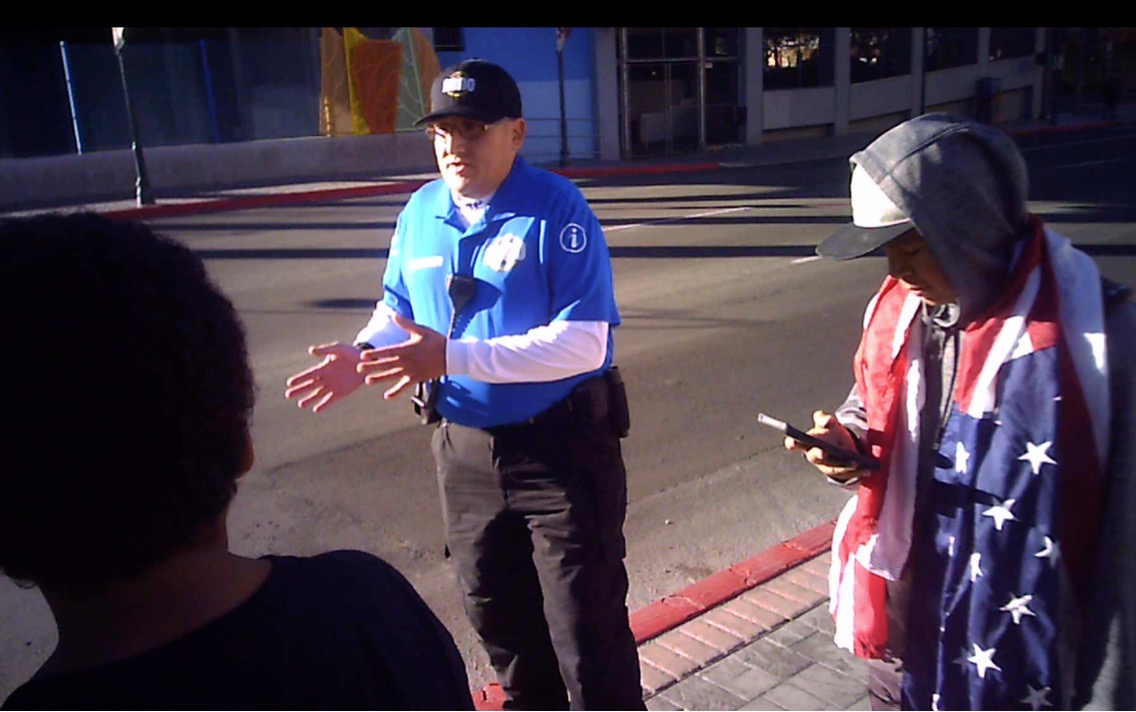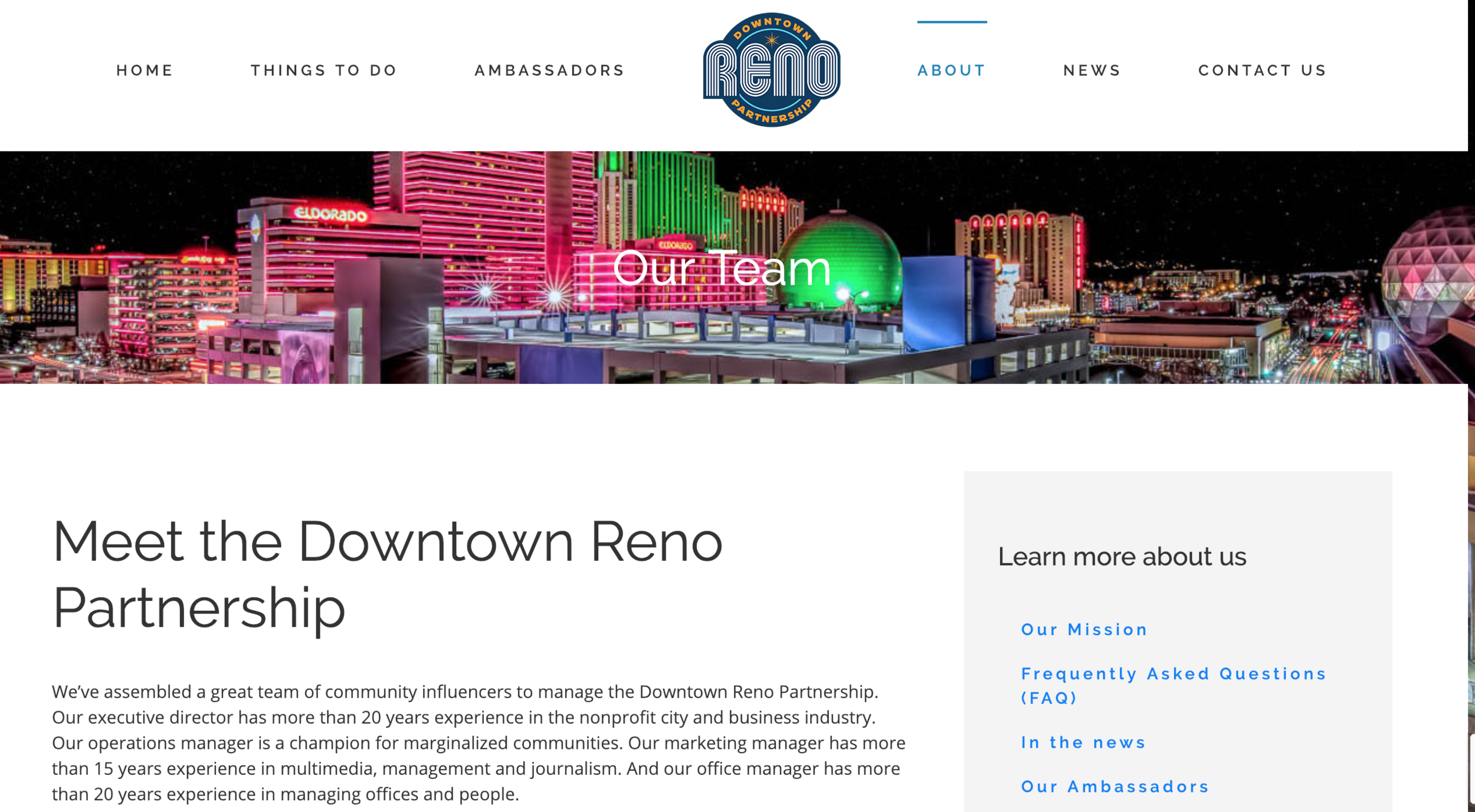Explaining the Role of Ambassadors
When we asked to interview downtown ambassadors, we were told we needed to interview Alex Stettinski, the executive director of the “private non profit” Downtown Reno Partnership, which according to its website is also the first business improvement district in Nevada.
Stettinski’s bio page states the former vice president at Visit West Hollywood “will also become the face of downtown Reno with plans to encourage new businesses to enter the core.”
One of the most visible components of this new initiative are the ubiquitous blue-shirted or blue-vested, Segway-riding “downtown ambassadors", hired through a company called Streetplus, which according to the website, has “25 years experience cleaning up city districts.”
“Ambassadors are a team of professionals, a team of people … being additional eyes and ears for the police force, so they support the police team, when it comes to smaller incidents, so that police really can focus on the things that they need to focus on and are not constantly distracted by very little minute things that they're being called for right now,” Stettinski said.
“They're also calling out any safety or cleanliness issues in the area and they work closely with Public Works, city hall to make sure that cleanliness issues are taken care of. And their hospitality guys on the street, they welcome visitors, they give them directions. They tell them where to go… And then they're also supporting our efforts to address homelessness … by forging relationships, you know, with the people that are on the streets, talking to them, connecting with them, and hopefully getting them into treatment or into facilities that will help them further if they choose to do so,” he said.
Stettinski said his passion lies in making downtown areas vibrant again.
Another “ambassador” keeps a close eye on Virginia street from the vantage of her Segway. “Just because there is a team in place that has Segways and wears a uniform doesn't mean that this team is bad and negative. It could be perceived as such because that's what usually is the case, this team comes in with a different approach. It's possible that this approach is not quite understood by some of the community,” Stettinski said of possible negative feedback.
Mixed Reviews and Concerns
We asked different people what their impressions were so far.
“They’re to facilitate anything we may need out here,” said Sierra, who’s going into her seventh year living on the streets. “I think they are targeting homeless people but basically they’re for anyone, like say there’s a tourist that can’t find a place, they’ll give directions, but I think mostly it’s for us, to facilitate what we need out here.”
Some downtown workers, however, were less impressed. Darrell, a longtime casino worker, said that other issues should be getting more attention. “Health code violations in some of the buildings, and illicit drugs on the street, and uh solicitations for sex,” he said of what he thinks should be the focus.
The first year budget for the overall project is reported to be $2.3 million. The money is said to be going toward the nonprofit's staff and operations, downtown street maintenance, extra police and paying the ambassadors themselves.
The project is set to last 10 years, with an evaluation scheduled halfway through.
Robert, a retiree who started living on the streets earlier this year, said the ambassadors helped connect him to the local Gospel Mission. “They do a fine job in itself, um, talking to people, and helping the homeless people with their ability to stay out of the cold,” he said. “They’re up to par, they say what’s right and what’s wrong.”
Others we spoke to off the record said they didn’t like the connection between ambassadors, the Downtown Reno Partnership and local police, saying it created distrust.
Defending the Ambassadors
Stettinski, whose Facebook still has him listed as living in Beverly Hills, said dealing with the homeless is “complex”. He points to operations manager, Grant Denton, having been homeless and an addict himself in the past. “He understands what people go through,” Stettinski said of Denton. “I mean, he has more compassion. And so that's what the ambassadors, that's the angle that they're coming from, is trying to understand, trying to connect and then trying to find a solution. “
“We don't intend to be a threat,” Stettinski said during our interview, addressing certain concerns from those living on the streets. “We’re intending to make changes, changes for the better.
Changes for the Downtown Homeless Population
“Sometimes the ambassadors are a little bit firm, and I don't think some of the homeless population that we have are used to that,” Stettinski continued, admitting ambassadors do create a new environment, which may not please everyone. “I think that they are used to just being left alone, to do whatever. And now, that has changed. So the ambassadors could be perceived as a threat possibly because of that. We do what needs to be done within the law to make sure that the area is revitalized. And at the same time, the individuals that we're dealing with … you know, they're not, just being pushed over or pushed around, but they're being taken care of.”
He said on average two people per day were deciding to go the downtown shelter after being talked to by ambassadors. Many of those living on the streets complain the shelter feels like prison, with many rules, fights, bullying, stealing, others screaming throughout the night, crammed sleeping, early hours you have to exit, a limit on your possessions, separation of couples and not having animals allowed, among several grievances.
A screengrab above of the Downtown Reno Partnership website.
An Inclusive Downtown?
Stettinski said his long term vision for downtown Reno is what he calls “balanced”.
“Balanced doesn't mean that there's no homeless people in downtown,” he said. “Absolutely not. I mean homeless people have as much of a right to enjoy any space as anybody else. That is not our goal whatsoever. Our goal is to create an environment that is balanced, an environment that homeless people as well as not homeless people feel comfortable in coming and enjoying. That's really the ultimate goal.”
He sees hope for downtown Reno, as he sees many caring people in the community including the ambassadors, even if he says some will resist this new effort.
“We all have to embrace change. We all have to realize things,” he said as we concluded the interview. “The status quo, the way it is, cannot be kept… I mean, look at downtown, it has proven that there are things missing and it has proven that the solution was not quite there so far. So the ambassadors are sort of the next attempt to find something. But it includes everyone. We go out of our way to walk people to wherever they want to be. Because … what I was told is that, you know, people, when they were talking about any programs and services that we have in this town, they don't feel comfortable going there. They don't know whether they're welcome, they don't know how to even talk to the front desk or something. So the ambassadors will do that for them. They go with them and they introduce them, and they hand them you know, to some other caring person in an organization. Seriously. I mean, I have to say that I have not met a community so far as caring for the demographics that you are now talking about as they are here. I'm being really, really serious. “









